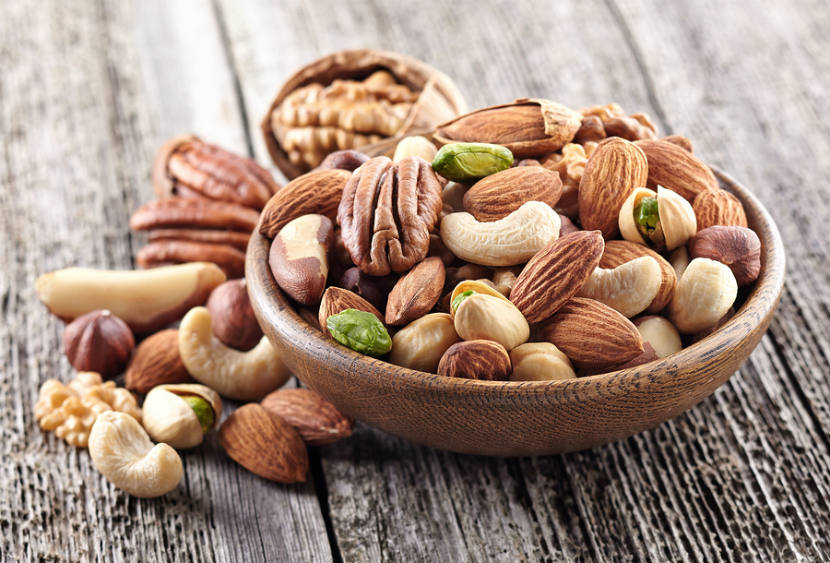
Research shows that eating nuts has many health benefits such as lowering your risk for gallstone disease. Including nuts as part of a nutritious diet has also been linked to reducing cholesterol and some types of cancers. Nuts make a fast and nutritious snack or can be added to meals for a fibre and protein boost. A little goes a long way! To get the nutrition benefits of nuts, you only need to eat a small portion - about the amount that can fit on the palm of your hand. Read on to learn more about using nuts.
For more on the health benefits of nuts read Choose Nuts and Seeds More Often.
Buying nuts
Try to buy nuts from a busy store. That way the stock is often refilled and the nuts don’t go bad. Most nuts should not be stored in bulk bins for more than 1 month because they can go bad quickly. If you can, buy nuts that are still in their shells because they will last longer.
Choose nuts that look fresh. Avoid those that are shriveled, moldy, bruised or give off a bad smell. Nuts that give off an unpleasant odour may be rancid (rotten).
Choose plain unsalted nuts most often. You’ll get the great flavour of nuts without added sugar or sodium (salt).
Storing nuts
The best way to store nuts is in an airtight container in a cool dry place, like the refrigerator. If storing at room temperature, store away from direct heat or light.
You can also freeze nuts. When freezing, use an airtight container or heavy duty freezer bag. If nuts develop an off flavour, bad smell or grow mold, throw them out.
Storage times for nuts (without their shell)
|
Type
|
Pantry
|
Fridge
|
Freezer
|
|
Almonds
|
Keep refrigerated
|
9 months
|
12 months
|
|
Brazils
|
Keep refrigerated
|
Up to 9 months
|
Up to 12 months
|
|
Cashews
|
Keep refrigerated
|
6 months
|
12 months
|
|
Chestnuts
|
Keep refrigerated
|
4-5 days
|
9-12 months
|
|
Macadamia
|
Keep refrigerated
|
6 months
|
9-12 months
|
|
Peanuts
|
Keep refrigerated
|
3 months
|
9-12 months
|
|
Pecans
|
Keep refrigerated
|
9 months
|
2 years
|
|
Pine nuts
|
2-3 months
|
Up to 12 months
|
Up to 12 months
|
|
Pistachios
|
Keep refrigerated
|
3 months
|
12 months
|
|
Walnuts
|
Keep refrigerated
|
6 months
|
12 months
|
Using nuts
Nuts come in a variety of forms. You can find them whole, chopped, flaked, dry roasted, oil roasted, salted, spiced, sugared, ground into flour, pastes and butters. As a result, there are many ways to add them to your meals. Here are some suggestions to help you enjoy the great taste of nuts more often.
*Remember, to get the nutrition benefits of nuts, you only need to eat a small portion - about the amount that can fit on the palm of your hand.
Breakfast:
- Try almond, cashew or peanut butter on your toast.
- Add unsalted chopped nuts to hot or cold cereal, yogurt, smoothies and muffins.
Recipes to try:
Almond Coconut Granola
Banana Nut Smoothie
Sweet Potato Toast with Nut Butter
Lunch:
- Add crunch to sandwiches with dry roasted unsalted peanuts or pistachios. (Crush or chop the nuts so they don’t roll out when you take a bite.)
- Top salads and soups with unsalted walnuts or almonds. (Increase the flavour of nuts by lightly toasting them. Place nuts in a dry frying pan over medium to high heat for 3-5 minutes. Nuts can burn quickly, so watch them carefully).
Recipes to try:
Bagel Crunch
Carrot and Apple Salad
Dinner:
- Try to eat one vegetarian dinner each week and use nuts as your protein source.
- Add unsalted nuts to stir fries, noodles, rice or vegetable dishes.
- Use ground nuts for coating chicken or fish instead of flour.
Recipes to try:
Butternut Squash Pasta
Chicken in Mexican Mole
Snacks:
- Keep unsalted nuts in your desk drawer, car, or knapsack to grab while on the go. (Don’t forget to mark the bag or container with the date, so you know how long they’ve been there. Remember to follow the storage recommendations for safe and proper handling).
- Substitute ground nuts (nut meal) for wheat flour in baked goods. This will change the texture, so limit to ¼ cup substitution.
Recipes to try:
No Bake Chocolate Almond Bliss Bars
Almond Butter Spiced Apple
Kid Pix Trail Mix
Granola and Fruit Bites
How can a dietitian help?
Dietitians can support you throughout many phases of your life from pregnancy to eating well when you are older. Counselling sessions with a dietitian can also help you to prevent and treat health conditions like diabetes and heart disease. Your dietitian will work with you to give you personalized advice that meets your lifestyle and goals. Connect with a dietitian today!
Bottom line
Nuts are a convenient and nutritious way to add protein, fibre, vitamins and minerals to any meal or snack. Store nuts in an airtight container in the fridge for maximum freshness.
You may also be interested in:
Your challenge – choose nuts and seeds more often!
Vegetarianism FAQs
Introduction to protein
This article was written and reviewed by dietitians from Dietitians of Canada. The advice in this article is intended as general information and should not replace advice given by your dietitian or healthcare provider.
Last Update – November 18, 2022